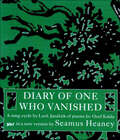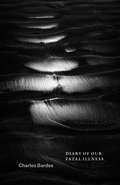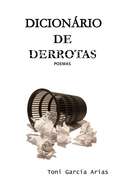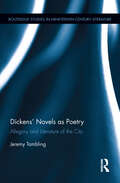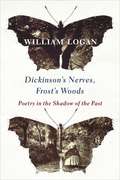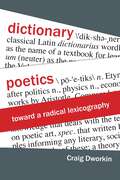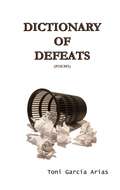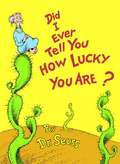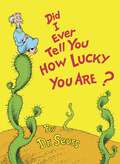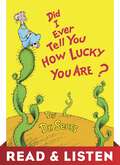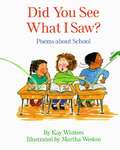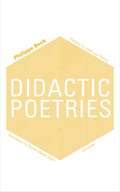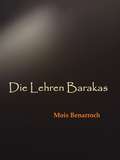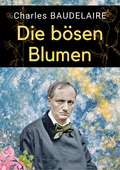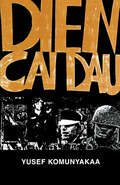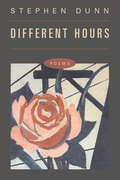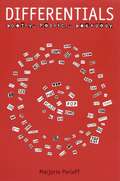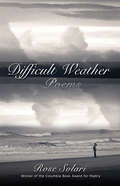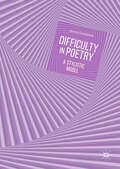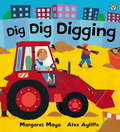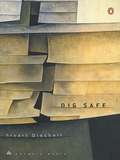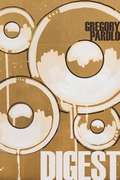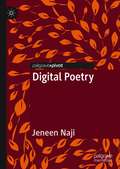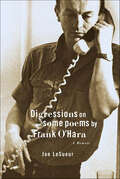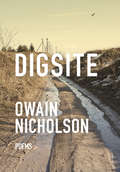- Table View
- List View
Diary of One Who Vanished: A Song Cycle by Leos Janacek of Poems by Ozef Kalda
by Seamus Heaney Leos JanacekA Cycle of Love Songs Translated by the Nobel Laureate"Dappled woodland light,Spring well chill and bright,Eyes like stars at night,Open knees so white.Four things death itself won't cover,Unforgettable forever."In 1917, while reading his local newspaper, the Czech composer Leos Janacek discovered the poems that he was to set to music in his song cycle Diary of One Who Vanished. Written by Ozef Kalda and published anonymously, they tell the story of a farmer's boy who abandons his home because he has fallen in love with a Gypsy. These new English versions by Seamus Heaney were commissioned by the English National Opera for a series of international performances, which opened in Dublin in October 1999.
Diary of Our Fatal Illness (Phoenix Poets Ser.)
by Charles BardesThis moving prose poem tells the story of an aged man who suffers a prolonged and ultimately fatal illness. From initial diagnosis to remission to relapse to death, the experience is narrated by the man’s son, a practicing doctor. Charles Bardes, a physician and poet, draws on years of experience with patients and sickness to construct a narrative that links myth, diverse metamorphoses, and the modern mechanics of death. We stand with the doctors, the family, and, above all, a sick man and his disease as their voices are artfully crafted into a new and powerful language of illness.
Dicionário de derrotas
by Toni Arias"Dicionário de derrotas" é o segundo livro de poemas de Toni García Arias. Neste poema o autor aborda os temas clássicos do mundo poético: a perda da infância e da juventude, o amor, o desamor, as lembranças, a poesia e o passar do tempo. O livro representa como um dicionário, já que os poemas aparecem ordenados alfabeticamente: Ausência, Beijos, Corpo, Distância, etc.
Dickens' Novels as Poetry: Allegory and Literature of the City (Routledge Studies in Nineteenth Century Literature)
by Jeremy TamblingFocusing on the language, style, and poetry of Dickens’ novels, this study breaks new ground in reading Dickens’ novels as a unique form of poetry. Dickens’ writing disallows the statement of single unambiguous truths and shows unconscious processes burrowing within language, disrupting received ideas and modes of living. Arguing that Dickens, within nineteenth-century modernity, sees language as always double, Tambling draws on a wide range of Victorian texts and current critical theory to explore Dickens’ interest in literature and popular song, and what happens in jokes, in caricature, in word-play and punning, and in naming. Working from Dickens’ earliest writings to the latest, deftly combining theory with close analysis of texts, the book examines Dickens’ key novels, such as Pickwick Papers, Martin Chuzzlewit, Dombey and Son, Bleak House, Little Dorrit, Great Expectations, and Our Mutual Friend. It considers Dickens as constructing an urban poetry, alert to language coming from sources beyond the individual, and relating that to the dream-life of characters, who both can and cannot awake to fuller, different consciousness. Drawing on Walter Benjamin, Lacan, and Derrida, Tambling shows how Dickens writes a new and comic poetry of the city, and that the language constitutes an unconscious and secret autobiography. This volume takes Dickens scholarship in exciting new directions and will be of interest to all readers of nineteenth-century literary and cultural studies, and more widely, to all readers of literature.
Dickinson's Nerves, Frost's Woods: Poetry in the Shadow of the Past
by William LoganIn Dickinson’s Nerves, Frost’s Woods, William Logan, the noted and often controversial critic of contemporary poetry, returns to some of the greatest poems in English literature. He reveals what we may not have seen before and what his critical eye can do with what he loves. In essays that pair different poems—“Ozymandias,” “On First Looking Into Chapman’s Homer,” “In a Station of the Metro,” “The Red Wheelbarrow,” “After great pain, a formal feeling comes,” and “Stopping by Woods on a Snowy Evening,” among others—Logan reconciles history and poetry to provide new ways of reading poets ranging from Shakespeare and Shelley to Lowell and Heaney.In these striking essays, Logan presents the poetry of the past through the lens of the past, attempting to bring poems back to the world in which they were made. Logan’s criticism is informed by the material culture of that world, whether postal deliveries in Regency London, the Métro lighting in 1911 Paris, or the wheelbarrows used in 1923. Deeper knowledge of the poet’s daily existence lets us read old poems afresh, providing a new way of understanding poems now encrusted with commentary. Logan shows that criticism cannot just root blindly among the words of the poem but must live partly in a lost world, in the shadow of the poet’s life and the shadow of the age.
Dictionary Poetics: Toward a Radical Lexicography (Verbal Arts: Studies in Poetics)
by Craig DworkinThe new ways of writing pioneered by the literary avant-garde invite new ways of reading commensurate with their modes of composition. Dictionary Poetics examines one of those modes: book-length poems, from Louis Zukofsky to Harryette Mullen, all structured by particular editions of specific dictionaries. By reading these poems in tandem with their source texts, Dworkin puts paid to the notion that even the most abstract and fragmentary avant-garde literature is nonsensical, meaningless, or impenetrable. When read from the right perspective, passages that at first appear to be discontinuous, irrational, or hopelessly cryptic suddenly appear logically consistent, rationally structured, and thematically coherent.Following a methodology of “critical description,” Dictionary Poetics maps the material surfaces of poems, tracing the networks of signifiers that undergird the more familiar representational schemes with which conventional readings have been traditionally concerned. In the process, this book demonstrates that new ways of reading can yield significant interpretive payoffs, open otherwise unavailable critical insights into the formal and semantic structures of a composition, and transform our understanding of literary texts at their most fundamental levels.
Dictionary of Defeats
by Toni Arias“Dictionary of defeats” is the second book of poems by Toni García Arias. In this poetry the author approach the classic subjects of the poetic world: The loss of childhood and youth, love, lack of love, memories, poems and the passing of time. The book is presented as a dictionary, because the poems are ordered alphabetically: Absence, Body, Childhood, Distance, etc.
Did I Ever Tell You How Lucky You Are?
by Dr SeussThe skunk has troubles; no one likes its smell! The snake has troubles; peoples' fears won't quell. The porcupine has troubles; none will scratch his tail. The dog, I think, has troubles; fleas bite him without fail! To be a boy, then, I should say, Is best of all 'cause boys can play!
Did I Ever Tell You How Lucky You Are? (Classic Seuss)
by Dr. SeussDr. Seuss's irrepressible optimism is front and center in Did I Ever Tell You How Lucky You Are? The perfect send-off for grads getting ready to venture off into the world! "When you think things are bad, when you feel sour and blue,when you start to get mad . . .you should do what I do!" So begins the terrific advice of the wise old man in the Desert of Drize. This classic book provides the perfect antidote for readers of all ages who are feeling a bit down in the dumps. Thanks to Dr. Seuss's trademark rhymes and signature illustrations, readers will, without a doubt, realize just how lucky they truly are.
Did I Ever Tell You How Lucky You Are? Read & Listen Edition (Classic Seuss)
by Dr. SeussDr. Seuss&’s irrepressible optimism is front and center in Did I Ever Tell You How Lucky You Are? &“When you think things are bad, when you feel sour and blue, when you start to get mad . . .you should do what I do!&” So begins the terrific advice of the wise old man in the Desert of Drize. This classic book provides the perfect antidote for readers of all ages who are feeling a bit down in the dumps. Thanks to Dr. Seuss&’s trademark rhymes and signature illustrations, readers will, without a doubt, realize just how lucky they truly are.This Read & Listen edition contains audio narration.
Did You See What I Saw: Poems About School
by Kay WintersTwenty-four poems about various aspects of going to school.
Didactic Poetries (Univocal)
by Philippe BeckComplex, haunting, imaginative and profoundly literary, Didactic Poetries is Beck&’s response to Schiller&’s statement: &“We are still waiting for a didactic poem where thought itself would be and would remain poetic,&” and Hegel&’s claim that, &“strictly speaking, didactic poetry isn&’t poetry.&”For the acclaimed French poet, Philippe Beck, Schiller&’s task of attempting a didactic poetry remains as vital today as it was for Schiller&’s time. Is there a way to construct a poetry built and chiseled, hammered and stitched, from out of past narratives and poetries, condensed in such a manner as to make new poetic verses sing new truths? Forging a singular attempt to echo the poets and tales of a bygone age, Beck&’s didactic poetries perhaps carve out the path for renewing a poetic thought as a quasi-musical atmosphere where the reader can glimpse &“A small country &“sculpted&” as spiritual, supposed to be so at home in the Bygone Country. Alluvial layers so light, that weather disappeared, weary of variety a priori.&” Beck&’s deftly textured poems interweave contemporary commentary with cultural, historical, literary, and philosophical allusions, drawing the reader into a world of lived poetic experience.
Die Lehren Barakas
by Mois Benarroch Florian SchuhmacherMois Benarrochs gefeiertes Langgedicht, erstmals in deutscher Sprache. Benarroch gilt als einer der bedeutendsten israelischen Dichter. Seine Poesie wurde in einem Dutzend Sprachen veröffentlicht, darunter Urdu und Chinesisch. Nach Julia Uceda hält Benarroch in seinen Gedichten das Gedächtnis der Welt fest, während Jose Luis Garcia Martin gar meint, seine Werke seien mehr als Poesie, nämlich Zeugnisse. Als Zeuge seiner Zeit begann Benarroch mit 15, Gedichte auf Englisch zu verfassen, und hat stets auch auf Spanisch, seiner Muttersprache, geschrieben. Seit seinem 20. Lebensjahr dichtet er außerdem auf Hebräisch und hat seitdem sechs Gedichtbände in Israel veröffentlicht. "Wenn ich jemanden für den Nobelpreis nominieren dürfte, wäre er dafür im Rennen." - Klaus Gerken, Herausgeber von Ygdrasil Benarrochs Ansehen ist stetig gestiegen und seine Bücher sind in Spanien, Israel und den Vereinigten Staaten veröffentlicht worden. Er wurde 2008 mit dem Preis des israelischen Premierministers für Autoren und 2012 mit dem Jehuda-Amichai-Preis für Poesie ausgezeichnet.
Die bösen Blumen
by Charles BaudelaireFür den Leser Dummheit, Irrtum, Sünde, Sparsamkeit, Beschäftige unseren Geist und arbeite unseren Körper, Und wir nähren unsere freundliche Reue, Als Bettler füttern sie ihr Ungeziefer. Unsere Sünden sind hartnäckig, unsere Reue ist feige; Wir werden für unsere Geständnisse gut bezahlt, Und wir betreten fröhlich den schlammigen Weg, Der Glaube an Basentränen wäscht alle unsere Flecken weg. Auf dem Kissen des Bösen liegt Satan Trismegistus Was unseren verzauberten Geist für eine lange Zeit wiegt, Und das reiche Metall unseres Willens Wird alles von diesem gelehrten Chemiker verdampft. Es ist der Teufel, der die Fäden hält, die uns bewegen! In abstoßenden Objekten finden wir Reize; Jeden Tag in Richtung Hölle machen wir einen Schritt zurück, Ohne Entsetzen durch stinkende Dunkelheit. Wie eine arme Ausschweifung, die fickt und isst Die Märtyrerbrust einer alten Hure, Wir stehlen ein unterirdisches Vergnügen Dass wir sehr fest drücken wie eine alte Orange. Enge, schwärmende, wie eine Million Helminthen, In unserem Gehirn kräuselt sich ein Volk der Dämonen, Und wenn wir atmen, Tod in unseren Lungen Abstieg, unsichtbarer Fluss, mit gedämpften Beschwerden.
Dien Cai Dau (Wesleyan Poetry Ser.)
by Yusef KomunyakaaThis collection by the Pulitzer Prize-winning poet is &“a major contribution to the body of literature grappling with Vietnam&” (Poetry). Yusef Komunyakaa is renowned for his ability to blend memory and history with strikingly evocative poetic imagery. Born in the rural community of Bogalusa, Louisiana, Komunyakaa served in Vietnam as a correspondent and editor of The Southern Cross and received a Bronze Star for his service as a journalist. In Dien Cai Dau, he applies this unique sensibility to his experience of the Vietnam War. The resulting poems have been called some of the finest Vietnam testimony ever documented in verse or prose. &“So finely tuned are Komunyakaa&’s images, so faultless his vision, that the reader sees precisely what the poet recalls . . . A powerful must-read for those who have forgotten those days.&” ―Booklist
Different Hours: Poems
by Stephen DunnA wise and graceful new collection by one of our "major, indispensable poets" (Sidney Lea). The mysteries of Eros and Thanatos, the stubborn endurance of mind and body in the face of diminishment--these are the undercurrents of Stephen Dunn's eleventh volume. "I am interested in exploring the 'different' hours," he says, "not only of one's life, but also of the larger historical and philosophical life beyond the personal."<P><P> Winner of the 2001 Pulitzer Prize for Poetry.
Differentials: Poetry, Poetics, Pedagogy
by Marjorie PerloffA new collection of essays from a distinguished critic of contemporary poetry. Marjorie Perloff is one of the foremost critics of contemporary American poetry writing today. Her works are credited by many with creating and sustaining new critical interest not only in the work of major modernist poets such as Yeats, Pound, Eliot, and Williams but also in the postwar tradition of American poetic innovation that ranges from the Black Mountain poets, through the New York School and concrete poetry, to the Language Poets of the 1980s and '90s. In Differentials, Perloff explores and defends her belief in the power of close reading, a strategy often maligned as reactionary in today's critical climate but which, when construed differentially, is vital, she believes, to any true understanding of a literary or poetic work, irrespective of how traditional or experimental it is. Perloff also examines key issues in modernism, from Eliot's conservative poetics and Pound's nominalism to translation theory (Wittgenstein, Eugene Jolas, Haroldo de Campos), and the contemporary avant garde, as represented by writers like Susan Howe, Tom Raworth, Rae Armantrout, Ron Silliman, Ronald Johnson, Caroline Bergvall, and Kenneth Goldsmith. Ultimately, Perloff's most important offerings inDifferentialsare her remarkably original reflections on the aesthetic process: on how poetry works, and what it means, in and for our time.
Difficult Weather
by Katherine Young Rose SolariThis new edition of the first full-length collection of poems by award-winning writer Rose Solari provides an important window into the origins and early influences of this now-established poet and novelist. Though most of these poems are set in Washington, DC, and its less affluent suburbs, their lyrical, often elegiac depictions of family and neighborhood life, first love and first losses, will be sure to touch anyone who, like Solari, grew up in a place "more interesting than safe." In selecting Difficult Weather for the Columbia Book Award, Carolyn Forché, now Director of the Lannan Center for Poetry, said of Solari, "Her language is by turns raw and luminous, her perceptions uncommonly acute, and her vision at once incisive and compassionate." Michael Collier, Director of the Bread Loaf Writer's Center, wrote that she is "a poet of passion and precision... Difficult Weather will delight and surprise us all." This edition features a new introduction by poet and translator Katherine E. Young, who places Solari's early work in a national context, and traces some of the poet's most powerful influences, such as the work of Anne Sexton. Its publication, timed to coincide with that of Solari's third poetry collection, The Last Girl, insures that all of Solari's published poetry collections are now in print, for her fans to savor and for new readers to discover.
Difficulty in Poetry: A Stylistic Model
by Davide CastiglioneThis book theoretically defines and linguistically analyses the popular notion that poetry is ‘difficult’ - hard to read, hard to understand, hard to engage with. It is the first work to offer a stylistic and cognitive model that sheds new light on the mechanisms of difficulty, as well as on its range of potential effects. Its eight chapters are organised into two thematic parts. The first traces the history of difficulty, surveys its main scholarly traditions, addresses related themes – from elitism to obscurity, from abstraction to intentionality – and introduces a wide array of analytical tools from literary theory and cognitive psychology. These tools are then consistently applied in the second part, which includes several extended analyses of poems by canonical modernists such as Ezra Pound, Wallace Stevens and Hart Crane, alongside those of postmodernist innovators such as Geoffrey Hill, Susan Howe and Charles Bernstein, among others. This innovative work will provide fresh insights and approaches for scholars of stylistics, literary studies, cognitive poetics and psychology.
Dig Dig Digging (Awesome Engines #3)
by Margaret MayoAll the favourites are here in this bright, bold picture book for machine-mad little ones - from diggers and tractors, to cranes, bulldozers and more!With fun, rhyming text and vibrant artwork, this is perfect for sharing and reading aloud. Children will love spotting all the details on each page and joining in with all the different sounds; as tractors 'squelch' through the mud and dumper trucks go 'crash!'.Part of the best-selling Awesome Engines range.
Dig Safe
by Stuart DischellStuart Dischell's poetry is passionate, darkly comic, heartbreaking, and always unpredictable. Dig Safe reaffirms why he commands high regard among poets and critics and popularity among his readers. Taking as their metaphor the markings that construction workers use to warn of utilities below street level--these new poems pierce the body politic as they evoke interconnection and misalliance, movement and inhabitation.
Digest
by Gregory PardloFrom Epicurus to Sam Cooke, the Daily News to Roots, Digest draws from the present and the past to form an intellectual, American identity. In poems that forge their own styles and strategies, we experience dialogues between the written word and other art forms. Within this dialogue we hear Ben Jonson, we meet police K-9s, and we find children negotiating a sense of the world through a father’s eyes and through their own.<P> Winner of the 2015 Pulitzer Prize for Poetry
Digital Poetry
by Jeneen NajiThis book examines contemporary forms of digital poetry in emerging technologies such as drones, machine learning, Instagram, virtual reality and mobile devices. Theoretical frameworks that engage with posthumanism, multimodality, hermeneutics and eco-writing are used to examine the changing shape of the literary artefact in the second age of machines. The book contextualises the necessity of a multidisciplinary approach for a complex artefact and gives a broad overview of the field and history of digital poetry as a subset of the genre of electronic literature. Naji examines Instapoetry and the literary algorithm, haptic hermeneutics and poetry apps. The discussion also engages with eco-writing and drone poetry, poetic mirror worlds, and mixed reality poetry, concluding with an examination of the future of poetics and literary expression in the second age of machines.
Digressions on Some Poems by Frank O'Hara: A Memoir
by Joe LeSueurAn unprecedented eyewitness account of the New York School, as seen between the lines of O'Hara's poetryJoe LeSueur lived with Frank O'Hara from 1955 until 1965, the years when O'Hara wrote his greatest poems, including "To the Film Industry in Crisis," "In Memory of My Feelings," "Having a Coke with You," and the famous Lunch Poems—so called because O'Hara wrote them during his lunch break at the Museum of Modern Art, where he worked as a curator. (The artists he championed include Jackson Pollock, Joseph Cornell, Grace Hartigan, Jane Freilicher, Joan Mitchell, and Robert Rauschenberg.) The flowering of O'Hara's talent, cut short by a fatal car accident in 1966, produced some of the most exuberant, truly celebratory lyrics of the twentieth century. And it produced America's greatest poet of city life since Whitman.Alternating between O'Hara's poems and LeSueur's memory of the circumstances that inspired them, Digressions on Some Poems by Frank O'Hara is a literary commentary like no other—an affectionate, no-holds-barred memoir of O'Hara and the New York that animated his work: friends, lovers, movies, paintings, streets, apartments, music, parties, and pickups. This volume, which includes many of O'Hara's best-loved poems, is the most intimate, true-to-life portrait we will ever have of this quintessential American figure and his now legendary times.
Digsite
by Owain NicholsonDigsite draws on Nicholson's experience working in the Alberta oil sands and arboreal forest, taking an archaeological lens to its subject, and in this way, reimagines tens of thousands of years of human existence. These poems grow from a schism between the current place of living and the ones in which we are pulled back to, in particular, the places we no longer occupy.Nicholson's language draws on his archaeological and fieldwork background as he burrows and grinds the places we have lost, consistently underpinned by the grief that must accompany such a fervent exploration. In these discoveries, Nicholson presents us with the material remains of our own abandonment, of loss and acceptance, and ultimately leaves us with more questions than when we began.
